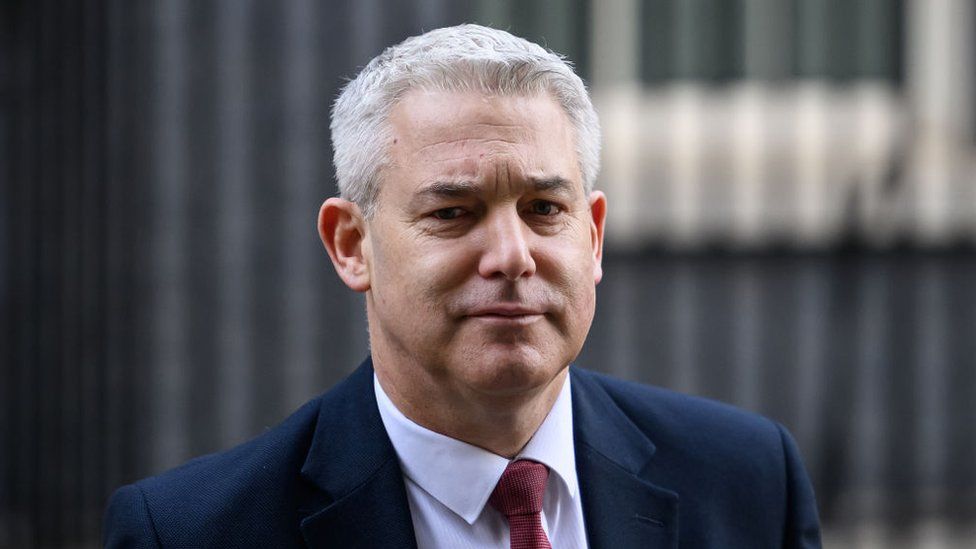
Steve Barclay opposes a proposed incinerator in his Cambridgeshire constituency
By Helen Catt & Chris Mason, political editor
BBC News
The government has temporarily banned permits for new incinerator plants in England, including one the Environment Secretary Steve Barclay is fighting to stop being built in his constituency.
The environment department will now consider how many plants are needed.
It comes after a top government lawyer warned a plan being explored to pause permits was “unlawful”.
This month Mr Barclay said the proposed incinerator in his Cambridgeshire seat was a “massive blot on the landscape”.
The large energy-to-waste plant is being proposed in Wisbech, in the North East Cambridgeshire constituency.
The decision to instruct the Environment Agency to temporarily stop granting licences was made by junior Environment Minister Sir Mark Spencer, after Mr Barclay was recused from the process.
In a letter to the agency’s head, Sir Mark says he is worried about the risk that expanding incineration capacity could pose to environmental obligations.
He describes it as a “temporary pause” to allow government officials to “lead a piece of work considering the role of waste incineration in the management of residual waste in England”.
The work will consider whether the capacity being developed fits with government objectives to reduce the amount of waste incinerated and will look at concerns about “over-provision”. It could lead to a further formal review.
Earlier this month, Mr Barclay suggested that the case for new incinerators would be “undermined” by making progress on a government target to halve the waste which goes to them.
A source from Department for Environment, Food and Rural Affairs (Defra) said the environment secretary would not have any involvement in the work.
The order is set to expire on 24 May but could be withdrawn earlier.
Applications for 10 incinerators across England are thought to be affected, but plants which dispose of clinical or hazardous waste are exempt from the pause.
‘Serious concerns’
In March, the BBC saw an internal legal note which had been compiled within government after consultation with Sir James Eadie KC, the First Treasury counsel.
At that point it is understood the government was privately exploring the consequences of pausing licences for up to a year.
The note said that that proposal raised “serious concerns of perceived bias” as it had come shortly after permission was granted by the Department for Energy Security and Net Zero (Desnez) for the Wisbech incinerator to be built.
The plant still needs a licence from the Environment Agency, a non-departmental public body, to go ahead.
The legal note advised that the proposed suspension would have been “unlawful” because “the consultation undertaken…was plainly inadequate” and noted “the context of the secretary of state’s constituency interests”.
Image source, MVV UK
The waste incinerator could be built in an industrial part of Wisbech on the Cambridgeshire-Norfolk border
‘Massive blot on landscape’
In an article written for this month’s edition of a local Cambridgeshire magazine, “Discovering Wisbech”, Mr Barclay wrote he was committed to “doing everything possible to fight” the new incinerator.
He described it as a “massive blot on the landscape” and said that he had already had conversations with Fenland District Council about supporting them in bringing forward a judicial review of the decision to grant planning consent.
A spokesperson for Defra said the department was committed to reducing waste, improving recycling and meeting net zero targets for sending less waste for incineration.
“We must make sure we have the right waste management infrastructure to meet these goals, and are rightly considering the need for more waste incineration facilities.”
But Labour’s shadow environment secretary Steve Reed said there were “serious concerns” Mr Barclay abused his position to prop up his constituency decision.
“The British public deserve answers. Who did Barclay try to persuade, when, and which other ministers were involved,” he said.
Mr Barclay told a committee of MPs in March that he had never “made representations as secretary of state” to the Environment Agency about the Wisbech project.
He also said that he had delegated the policy to another minister and apologised for not formally recusing himself earlier.
Image source, Emma Baugh/BBC
Protesters opposed to the proposed site said it would cause pollution in the area








